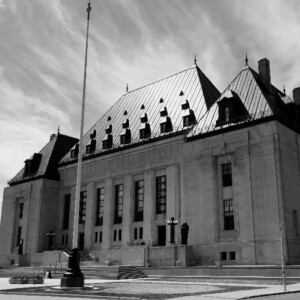
Supreme Court of Canada Hearings
Government

Attorney General of Ontario v. Working Families Coalition (Canada) Inc., et al. (Day 2/2) (40725)
 2024-05-23
2024-05-23
This case concerns the third party spending limits most recently added to the Election Finances Act, R.S.O. 1990, c. E.7 (“EFA”), in 2021, and whether they infringe the informational component of the right to vote (i.e., a citizen’s right to exercise their vote in an informed manner), which is protected by s. 3 of the Charter.
The amendments to the EFA sparked constitutional challenges. The application judge heard and decided two sequential proceedings.
In the first proceedings: Working Families Ontario v. Ontario, 2021 ONSC 4076, 155 O.R. (3d) 545 (“Working Families 1”), the application judge concluded that the extension of a 6-month pre-writ restricted period to one that was doubly restrictive was unjustifiable as it did not minimally impair the free expression rights of third party advertisers.
In response to that ruling, the Ontario government announced its intention to invoke the notwithstanding clause in s. 33 of the Charter, and introduced Bill 307, which received Royal Assent five days later as the Protecting Elections and Defending Democracy Act, 2021, S.O. 2021, c. 31 (“PEDDA”). Other than the addition of the notwithstanding clause, the PEDDA amendments to the EFA are identical to the amendments that were invalidated in Working Families 1.
In the second proceedings, which give rise to these appeals, the legislation was challenged as a violation of s. 3 of the Charter, and as an improper use of s. 33 of the Charter. The application judge concluded that the use of the notwithstanding clause in enacting PEDDA was not improper, and that the re-enacted spending limits on third party advertising during the pre-writ period did not infringe the right to vote under s. 3.
The majority of the Court of Appeal agreed that the notwithstanding clause was properly invoked. However, it concluded that the appeals should be allowed and declared the challenged spending restrictions invalid, but would suspend the effect of the declaration for 12 months.
Argued Date
2024-05-22
Keywords
Charter of rights — Constitutional law — Elections — Right to vote — Third party election spending limits — Constitutionality of limits imposed by Ontario Election Finances Act, on third party political advertising expenditures in Ontario during 12-month pre-writ period before a fixed date provincial election — Whether s. 37.10.1(2) of Election Finances Act, unjustifiably infringes s. 3 of Charter — What is appropriate standard of review — Whether majority of Court of Appeal erred by reformulating test in Harper v. Canada (Attorney General), 2004 SCC 33, [2004] 1 S.C.R. 827, to turn on two “proxies”, namely whether restrictions are “carefully tailored” and whether they permit a “modest information campaign”, and thereby conflating s. 2(b) and s. 3 analyses — Whether majority erred in importing justificatory analysis to s. 3, and in scrutinizing government’s rationale for where lines had been drawn for amount and duration of spending limits — Whether majority erred by failing to give deference to application judge’s factual findings — Whether majority erred by focusing on “change” in impugned spending restrictions as compared with earlier iterations of legislation — In alternative, is any breach of s. 3 justified under s. 1 — Election Finances Act, R.S.O. 1990, c. E.7.
Notes
(Ontario) (Civil) (By Leave)
Language
Floor Audio
Disclaimers
This podcast is created as a public service to promote public access and awareness of the workings of Canada's highest court. It is not affiliated with or endorsed by the Court. The original version of this hearing may be found on the Supreme Court of Canada's website. The above case summary was prepared by the Office of the Registrar of the Supreme Court of Canada (Law Branch).
More Episodes
 2024-02-12
2024-02-12
 26
26
 2024-02-12
2024-02-12
 218
218
 2023-12-08
2023-12-08
 41
41
 2023-12-08
2023-12-08
 579
579
 2023-12-05
2023-12-05
 266
266
 2023-12-02
2023-12-02
 12
12
 2023-12-02
2023-12-02
 8
8
 2023-12-02
2023-12-02
 11
11
Create your
podcast in
minutes
- Full-featured podcast site
- Unlimited storage and bandwidth
- Comprehensive podcast stats
- Distribute to Apple Podcasts, Spotify, and more
- Make money with your podcast
It is Free
- Privacy Policy
- Cookie Policy
- Terms of Use
- Consent Preferences
- Copyright © 2015-2024 Podbean.com




